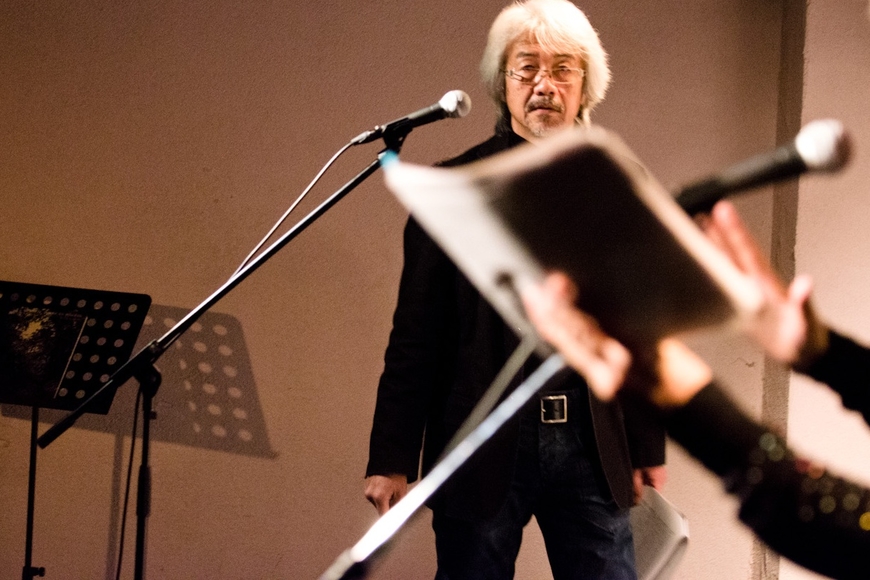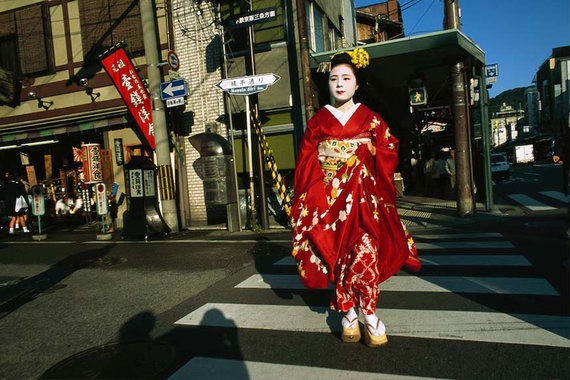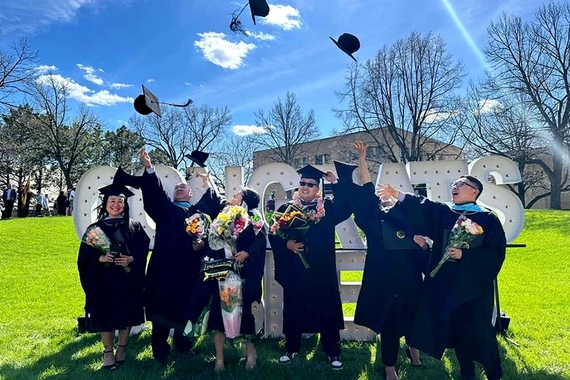“Japan,” Colonialism, and Poetics: An interview with Keijirō Suga, Mary Griggs Burke Chair in Asian Studies (2023-2024)
Keijiro Suga is the Mary Griggs Burke Chair in Asian Studies (2023-2024). This semester he is teaching a combined undergraduate/graduate seminar, 13 Ways of Looking at Japanese Literature and Thought, and presenting "Eastern Poetic Impulses: Three Writers/Two Conversations LIVE" along with two other writers. Asian and Middle Eastern Cultures and Media graduate student Hunter Mcleod sat down with him to discuss his teaching and research projects.
AMES PhD student Hunter Mcleod: First of all, I want to thank you for joining us this semester in the Department of Asian and Middle Eastern Studies. The course you have been teaching has been fascinating so far. What made you decide to focus on Ainu and Okinawan cultures? Can you speak a little about your thought process in creating this course?
Keijiro Suga: As this course was listed under Asian Studies, I didn’t want to focus on Japan only. I wanted to disturb a little bit what American students might have as accepted images of Japan, and in an interesting way. There are several topics I could easily think of. Tokyo Heterotopia, a decade-long project I’ve been involved in, is one. As 2023 is the centennial year of the Great East Japan Earthquake, to concentrate on that and other instances when Japan’s obnoxious and extremely malicious racism flared up is one. I could also have talked about the destruction of nature in Japan in the past hundred and fifty years. The more I thought about it, the more depressed I got. So, I decided to do something I always wanted to learn myself. That’s the socio-cultural history of the Ainu and Okinawa. I thought this would be a good occasion to gather my thoughts on them.
HM: From an Area Studies or Japan Studies point of view, how do you think having knowledge of Ainu and Okinawan cultures and histories changes the way we think about Japan?
KS: You will learn the fact that Japan is not what you think it is! The whole contour of Japan as a solidified nation-state doesn’t hold anymore, once you begin to think seriously about these areas and cultures. Especially when you think about the dynamics of colonialism. Japan in the first place is an ancient colonized country. If you speak like the historian Okada Hidehiro, Japan is a country established as the Baekje government in exile after the Battle of Baekgang in 663. As you (Hunter) now know, the Ryukyu islands were colonized and heavily exploited by Satsuma. Ainu Mosir also was dominated by Matsumae Han and the Ainu people were enslaved in a cruelest way. And now Okinawa epitomizes the still-occupied Japan! Being on the fringe, both Ainu and Okinawan cultures teach us a lot, but my not-so-hidden reason of choosing these two cultures is to think about the dynamics of colonization and domination.
HM: You also generously participated in a recent event we had here at the University of Minnesota, where you and poet Yasuhiro Yotsumoto gave poetry readings and had a conversation about your own personal writing processes. Akutagawa prize-winning author Kotomi Li also read one of her short stories and discussed her work. Do you find situating yourself in a community of writers to be important to the writing process?
KS: No! Writing is one of the few human activities you can fully do without participating in a community. The implicit community is always already given as a community based on language alone. All of us writers, serious writers, are just working on our own solitary, happy, suicidal road. It’s just, given an institutional setting, writers together can explain ourselves to the general public who may or may not be our particular readers…
I believe we have a lot to offer to readers and beginning writers alike, as we have invested an immense amount of time a piece, Yotsumoto or I… But all this has nothing to do with one’s own writing process. It’s just shop talk and mostly about how to keep the industry (publishing) afloat.
HM: You wear many hats: poet, critic, teacher, translator, musician, and so on. Can you talk a little bit about how these many roles work together or not? For example, does being a poet inform your academic work or vice versa?
KS: Jack of all trades…and Buridan’s multi-purpose donkey. Master of none and eternal disciple of all. You know how I detest spectator sports. To excel in a sport is good, but it requires too much specialization and competition and industrialization that are possible only in this world of overly controlled capitalism. To play a sport professionally is good… but think about how much is lost for that purpose? One very laughable thing about American universities is that spectator sports are considered superior to what you yourself do for fun and pleasure and discovery. For some students sports or games come first and foremost; before studying! This is ridiculous. I went to school and graduate school because I wanted to study!
That said, to me the practice of literature is one. Reading and writing is one, poems and prose are one, literary works and criticism are one, theory and practice are one, teaching and learning are one, and reading (again) and translating are one. To think otherwise is just an illusion. Literary activity can be summarized as reading and writing, and when you are trying that, it just continues 24/7 all year round. That’s what I do. I read just about everything around me, all traces, then I trace back, write back. Fight back, if necessary. As simple as that. That’s my version of applied grammatology and I haven’t done anything else at least for the past thirty-five years.
HM: You are also well-known, both in Japan and abroad, as an accomplished translator. You have translated texts into Japanese from several languages including English, Spanish, and French. How does your translation work change the way you think about poetry and literature?
KS: Translation taught me everything. It’s an extremely slow way of reading and you notice a lot of things on the way. That’s how I learned to construct my own sentences and paragraphs. Learning is really learning the maniera (the Italian word for manner and at the origin of the word manierismo) of learning (or reading or writing). One’s mode. The master’s mode. Learn the master’s mode of thinking and expressing. There is no other way for a disciple, really, and then it comes back to the matter of how much belief you can have in your chosen master, your teacher. Translation automatically puts you in the place of a disciple and that’s a good thing. If I were to give you an example, read my essay at the end of my translation of Jean-François Lyotard’s Le postmoderne expliqué aux enfants. It’s a fairly substantial essay, written at the end of the last century, but is still readable, I believe. Why did I write it that way? Because I wrote what I had learned by translating Lyotard. Translation is itself a mimetic criticism. And in learning literature, there is no other way. Believe me on this, or you are lost.
HM: In a recent interview in The New York Times, critically acclaimed author Banana Yoshimoto gave you a shout out, saying of your collection Elemental: Critical Essays, “It reads like a beautiful novel. I thought the preface, in which he addresses young people, was also brilliant. I feel blessed to be alive at the same time as someone as amazing as he is.” Can you tell us a little more about Elemental and why you chose to address younger generations in such a hopeful way?
KS: Well, actually she’s too sweet to mention that book. I know she’s been a longtime reader of my books, since my second book The Moon When the Wolves Run Together (1994). Maybe something in the book struck a chord in her heart. We all experience that among kindred souls… Elemental is a book of collected essays from three of my old books: Tropical Gossip (1998), Coyote Reading (2003), and Omniphone (2005), all now out of print. Elemental is all practical criticism about authors and works I admired. And about hope… I don’t know. We are already at the end of humanity as we know it, aren’t we? Why? Because, ultimately, of the absolute rule of money! The globalized capitalism that Félix Guattari was talking as CMI (integrated world capitalism) forty years ago. We are reduced to the final Oompa-Loompas of the despicable world market society and finding ourselves quite comfy in it. So, there is no hope. But as long as we keep masquerading as university-pluriversity-transversity, it is our humble duty to create hope. Produce hope, even without knowing what it looks like. Its search is our final pretext. If we give up, adieu la prochaine…
HM: Lastly, what are you working on now? What gets you excited about your work? What is inspiring you lately?
KS: I am supposed to finish translating a book on conservation biology and its almost done. This I wanted to do because it has a lot to do with a Dutch film that we released in Japan in 2016 with my subtitle: Rewilding. I have several other translation projects on the desk and am hoping to finish them maybe two per year… I know, I am too hopeful! A series of long poems is titled Library Poems and it’s already done. I am hoping it will come out as a book in Spring 2024. This will be my tenth poetry book. My poems are almost always written as thought experiments. Next year I will write more animal poems, for sure.
The one thing I really need to work on before I kick the bucket is a translation of my earlier poems collected in the four volumes of Agend’Ars series (2010-2013), 256 pieces of sixteen-line poems. This is my major work that resembles nothing in the history of Japanese poetry, and I will translate it myself so I can decide how much could be lost in translation. I don’t get excited about my work. It’s like a dog chasing a ball. What inspires me? Everything, absolutely everything, and their repetitions. Let a slight shift happen in every kind of repetition. That, after all, is what literature is all about. I want literature to be the critique of life.



